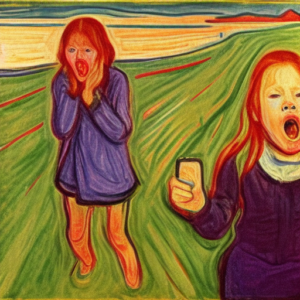
Internet addiction disorder is not included in the Diagnostic and Statistical Manual of Mental Disorders (DSM-V), but it may have a big influence on a teen’s life if they feel powerless or obsessed with using the Internet and it affects their mood, tolerance, social life, or academic performance. According to estimates, inappropriate Internet use is rather rare (3.6%) [21], and there have been shown to be strong links between Internet addiction or problematic Internet use and sadness, hostility, and drug misuse [22].
A high level of problematic Internet use was linked to social disengagement, anxiety, and sadness in a longitudinal study of Korean teenagers [21].
Problematic Internet use was strongly linked to depression among US female university students. According to the validated Patient Health Questionnaire-9 (PHQ-9) [23], young women who matched the criteria for depression were substantially more likely to be at risk of problematic Internet use. Severely depressed individuals were over eight times more likely to be at risk than peers who were not depressed, moderately depressed youth were over four times more likely to be at risk, and even mildly depressed individuals were over twice as likely to be at risk as peers who were not depressed [24]. Problematic Internet use may also be predicted by social anxiety. After adjusting for generalized anxiety disorder and depression, young people with considerable social anxiety report feeling more in control and having a lower opinion of online communication [25].
Why may teens with mental problems be more likely to engage in hazardous Internet use? The ability to participate in social networking groups without having to leave the comfort of their homes and the simplicity of communication on their own terms—for example, replying to messages after they have had time to consider their response—may be sources of relief for adolescents who suffer from anxiety on the Internet [26].
Online social networking and Internet usage time may have an effect on mental health for young people who are depressed. There certainly seem to be a correlation between depression, social networking websites, and the amount of time spent online, even if not all research have shown a link between social networking displays of mood and clinical depression [27]. In a study that looked at the Internet use habits of 189 older adolescents (mean age 18.9 years), those with low or normal Internet use (30 min or 30 min to 3 h) did not differ statistically from those with very high Internet use (>3 hours), but those with very high Internet use had significantly higher PHQ-9 scores (higher score is correlated with increased severity of depression).
The findings provide credence to the hypothesis that sadness and increased online time [28].
The Internet may exacerbate depression in young people who may already be socially withdrawn or have little contact with their peers, but it also has the ability to foster peer interaction, foster a sense of community, and provide access to mental health specialists after hours.
You can have a look at the expansion of screen time witch COVID : here
Source
21. Cho S, et al. Does psychopathology in childhood predict internet addiction in male adolescents? Child Psychiatry Hum Dev. 2013;44:549–55.
22. Liu T, et al. Problematic internet use and health in adolescents: data from a high school survey in Connecticut. J Clin Psychiatry. 2011;72:836–45.
23. Richardson LP, et al. Evaluation of the Patient Health Questionnaire-9 Item for detecting major depression among adolescents. Pediatrics. 2010;126:1117–23.
24. Moreno M, Jelenchick L, Breland D. Exploring depression and problematic internet use among col- lege females: a multisite study. Comput Human Behav. 2015;49:601–7.
25. Lee B, Stapinski L. Seeking safety on the internet: relationship between social anxiety and problematic internet use. J Anxiety Disord. 2012;26:197–205.
26. Wegemann E, Stodt B, Brand M. Addictive use of social networking sites can be explained by the inter- action of internet use expectancies, internet literacy, and pyschopathological symptoms. J Behav Addict. 2015;4:155–62.
27. Jelenchick LA, Eickhoff JC, Moreno MA. “Facebook depression?” Social networking site use and depression in older adolescents. J Adolesc Health. 2013;52:28–30.
28. Moreno MA, et al. Depression and internet use among older adolescents: an experience sampling approach. Psychology. 2012;3:743–8.